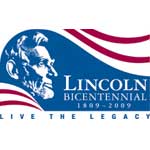Abraham Lincoln Bicentennial
 |
|
| Abbreviation | ALBC |
|---|---|
| Successor | Abraham Lincoln Bicentennial Foundation |
| Formation | 2000 |
| Type | State-Federal partnership |
|
ALBC Co-Chair
|
Richard J. Durbin |
|
ALBC Co-chair
|
Harold Holzer |
The Abraham Lincoln Bicentennial Commission (ALBC) was the Congressionally created 14-member federal commission focused on planning and commemorating the 200th birthday of the United States' 16th president on February 12, 2009. The commission served for ten years, from 2000 to 2010. Its official successor organization, announced in 2011 with an expanded board and broadened mission, is The Abraham Lincoln Bicentennial Foundation.
The ALBC was established by the passage of the Abraham Lincoln Bicentennial Commission Act in 2000 (Public Law No: 106-173). The commission's 14 members were a diverse group of political leaders, jurists, scholars and collectors, chosen for their knowledge of Lincoln and their experience educating the public on his life, times, and historical impact. The Commissioners were appointed by the President, the United States House of Representatives and the United States Senate, with input from the governors of Illinois, Indiana, and Kentucky. Commissioners included:
Eileen R. Mackevich served as Executive Director from 2006 to 2010. Her predecessor was Michael Bishop.
Other staff included:
ALBC offices are located in the John Adams Building of the Library of Congress in Washington, D.C.
Established by the United States Congress, the ALBC aims to celebrate the life and legacy of Lincoln while reinvigorating his thoughts, ideals and spirit throughout America and around the world. The commission's goals highlight numerous projects and cultural events including nine signature events:
Other ALBC tributes included:
Additional Lincoln Bicentennial events included:
The ALBC collaborated with numerous scholars and public figures as well as cultural and educational institutions to help educate and engage the public. An advisory board included more than 150 historians, scholars, civic leaders and Lincoln enthusiasts. Among them were Michael Beschloss, David Blight, Ken Burns, Richard Carwardine, David Herbert Donald, John Hope Franklin, Doris Kearns Goodwin, Dr. Allen C. Guelzo, James M. McPherson, Douglas Wilson, Orville Vernon Burton, Mario M. Cuomo, Dr. Roger Wilkins, Jack Kemp, and Sam Waterston.
...
Wikipedia
